Cultured Milk seems like one of those foods that your child should be able to eat pretty quickly, right? It’s mushy and soft, easy to find in the baby regular yogurt and regular yogurt aisle, and can have important nutritional value in your baby’s diet, so it seems like an obvious choice.
But, then you might stop for a second and say, “Wait, I thought my baby couldn’t have cow’s milk before my child’s first birthday… Can my baby eat regular yogurt? Can I offer yogurt as their snack?”
It’s a good question; the answer depends on how old your baby is. Babies are indeed allowed to have yogurt before they can have cow’s milk, but not immediately. Avoid yogurt if they haven’t tried cow’s milk.
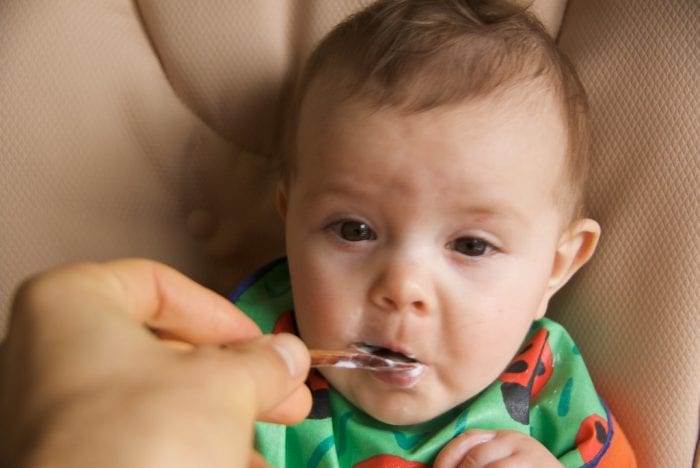
When Can My Babies Have Plain Yogurt Or Greek Yogurt?
Doctors generally recommend that the best yogurt for a 6-month-old baby can be given around this age, at the earliest – given that they are already easing into learning how to self feed and this is the time that the baby starts solids. Though it is not recommended to offer any other liquids (except for a few sips with baby’s solid foods) that can displace breastmilk or formula, most babies can have yogurt by 9-10 months. You should, of course, consult with your child’s pediatrician if you’re unsure about what would be best for your baby.
This is before the general recommendation of at least 1 year for cow’s yogurt, and it is because the culturing process that best organic yogurt for babies undergoes makes it easier for your baby to digest than milk.
Be sure to introduce them slowly and by itself at first so you can monitor how your baby’s body reacts to the new food.
Natural Yogurt Nutrition
Are you confused about whether baby yogurt will provide benefits to your little ones or just a marketing scheme to get you to spend more money?
It provides vital nutrients for your baby. This includes calcium, Vitamins A and D, and potassium. It also contains protein, zinc, choline, and iodine. The nutrients are important for the brain development and growth of your baby. Yogurts must have a significant amount of live active cultures (probiotics) that can improve the health of your child. It contains lactose too. Lactose is essential for the baby’s health and development too.
Don’t forget that your little ones do not need a low-fat diet, so baby whole-milk yogurt is recommended. Further, always check the nutrition label to avoid those with added sugars.
Baby Yogurt Vs Regular Yogurt
So what is the difference between baby yogurt vs regular yogurt? Is it true that the only difference is the price? Why is regular baby yogurt more costly? The following are the differences between the two:
- Adult yogurt generally has fewer healthy fats. Baby yogurt comes from full-cream milk and is full fat.
- Regular yogurt has more sugar content.
- Baby yogurt has fewer preservatives compared to regular yogurts.
- Usually, baby yogurts are produced from organic milk. Regular types are not.
- Most regular yogurts have more lactose.
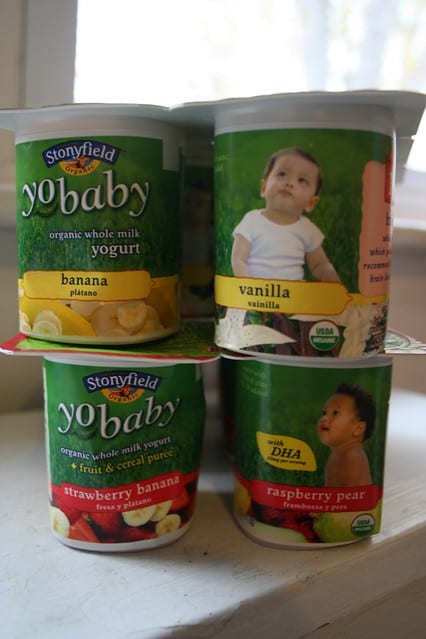
What Kinds Of Whole Milk Yogurt Can Babies Eat?
Regular Yogurt Vs Baby Yogurt
Although there are different types of yogurts with more or less the same ingredients in stores, it is not necessary to choose these adult yogurts over any sort of milk plain yogurt, and organic whole milk yogurt types. The most important thing is to check what the ingredients are. For example, if it’s a healthy fat yogurt – does it contain almond milk, soy milk, full cream milk, low-fat organic milk, or goat milk protein? Can it also provide vitamin D and other nutrients for the immune system? When introducing yogurt to a diet, especially for individuals with picky eating habits or food allergies, exploring options and other flavors like incorporating yogurt into overnight oats can be a tasty and nutritious solution.
You should try to avoid any yogurts that have extra additives like added sugar, artificial sweeteners, or even fruits. This is very important to remember especially when you first introduce your baby to healthy food and incorporate yogurt into their diet. So, instead of choosing flavored options, eat yogurt that has no flavorings or sweeteners instead.
You can opt for either regular vanilla yogurt or Greek yogurt. Greek yogurt has more protein, just make sure that it is whole milk yogurt.
If you find many baby yogurts made specifically for babies that meet all of these requirements, such as a plain, whole yogurt type, then it could be a good choice for baby-led weaning. Natural sugars present in pureed fruits or pureed vegetables can also be beneficial in such yogurts, especially for babies who may be lactose intolerant.
At the same time, if you opt for your preferred brand or a store brand of adult yogurt from the yogurt aisle that is not made specifically for babies, that’s okay, too, as long as it is whole yogurt, plain yogurt, and suitable for your baby’s needs.
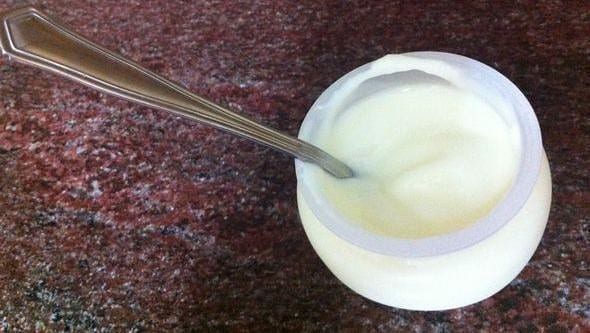
Frequently Asked Questions (FAQs)
Can My Baby Eat Organic Cultured Milk?
Starting at around 6-9 months, a regular baby can serve yogurt for babies. This can be confusing because they are not supposed to drink cow’s milk yogurt before one year, but adult yogurt is different for two primary reasons: First, it will not replace breast yogurt or formula. Second, unlike organic whole milk, it is cultured. This makes it easier for your babies to digest because of the milk yogurt protein that gets broken down during the culturing process. Flavored yogurts and dairy-free yogurt designed for babies and toddlers are also suitable alternatives to introduce at this stage, ensuring a diverse and enjoyable introduction to solid foods.
While there are some yogurts out there marketed as baby yogurt versus regular yogurt, by no means does a baby need to eat that kind of adult yogurt. Oftentimes those types have added sugars that are not good for your kids, especially young ones. It’s best to find a plain, whole-milk yogurt for your little one to try to begin.
What Kind Of Yogurt Is Best For A Baby?
Organic yogurt or plain, whole-milk yogurt is the best for a baby. It provides health benefits essential for the growth of your baby. It does not matter if it is regular yogurt or Greek yogurt, but it is key that you choose plain yogurt for your baby. That is so you avoid any potential sugar content or chemical additives that could be difficult for your baby to digest or that are unhealthy.
Remember that by no means should yogurt replace formula or breast milk yogurt, instead an addition to a baby’s diet that should be treated just like many other additions.
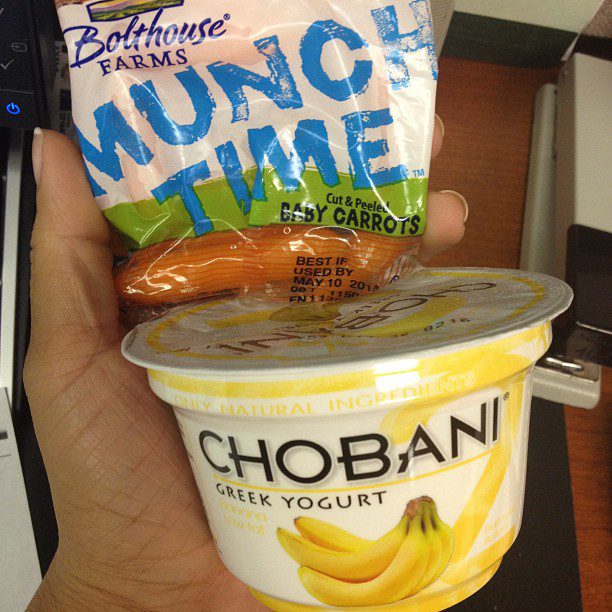
Why Can A Child Have Cultured Milk But Not Pure Milk?
There are two primary reasons why your little one can have yogurt long before they can have cow’s milk yogurt. The first is because of the culturing process that yogurt undergoes, which breaks down certain proteins in milk as it becomes yogurt. That process makes the yogurt easier for your baby to digest than other dairy products, although the same is true with cheese.
The second reason to consider is that yogurt should not interfere with the baby’s consumption of breast milk or formula – which should remain the baby’s main source of nutrition – and instead, you should think of yogurt as another addition to their diet, just like any other solid foods would be.
What Age Can My Kid Have Cultured Milk?
Although doctor recommendations vary as to when your baby can start eating yogurt, most agree that some can start to have yogurt as early as six months, and generally recommend that around 9-10 months is a safe time to start. Infant yogurt should not be offered during the first six months of the baby’s life. Further, low-fat and fat-free yogurts, and those with growth hormones are also not advisable for your babies.
You should, of course, consult with your baby’s pediatrician for more specific advice if you’re unsure because a medical professional can keep in mind the individual progress and nutritional needs of your baby.
Most doctors say that you can introduce this food just as you would any other solid food into a baby’s diet. That typically means in small quantities and by itself at first until you know how your regular baby’s body reacts to it, and then you can always add in both quantity and frequency.
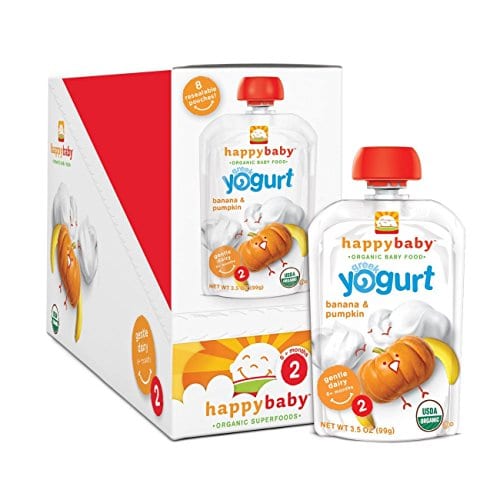
What Can I Mix Cultured Milk With For My Child?
Although doctors recommend that you start with plain yogurt for your child, if they respond well to plain yogurt, you can gradually start to add other food with the baby yogurt vs regular yogurt that your baby has previously responded well to (e.g., sources of lactic acid, healthy fats, etc.). The best yogurt for babies can be whole milk plain yogurt, or full fat with all the healthy bacterial cultures that their tummy needs.
Some ideas for add-ins include the addition of fruit: mashed banana, applesauce, mashed avocado, and other baby food.
The key is to make sure that everything is a similar consistency, so your regular baby won’t have any trouble mushing it and swallowing.
What Is The Healthiest Cultured Milk Option Ideal For Kids That Contains Live And Active Cultures And Less Sugar?
Can We Mix Banana With Cultured Milk?
You can mix bananas with yogurt for your baby as it has natural sugar. It’s a good idea to start with plain, whole milk yogurt or full fat yogurt for your baby and then add in other foods like cooked beets, baked goods, and fruits for additional flavor, artificial flavorings, and a nice source of healthy fats, instead of opting for a flavored yogurt (which most yogurts on the dairy aisle are).

When adding in other food, like bananas, make sure that everything is properly mashed or pureed so your regular baby will have no problem swallowing.
How Much Yogurt Is Too Much For A Baby?
For a child aged eight to twelve months, the recommended yogurt serving size is 1/4 to 1/2 cup. For 12 to 24-month-old toddlers, it is recommended that they get two to three servings of dairy per day. After age 1, they are allowed to consume 1/2 cup of yogurt in one of their daily dairy servings.
What Age Is Best For Baby?
How Can I Ensure My Babies’ Yogurts Don’t Contain Harmful Bacteria?
Is Greek Yogurt OK For Babies’ Digestive Health?
Is Yoplait Yogurt OK For Babies?
Is Nestle Cultured Milk Good For My Little One?
What Is The Healthiest Cultured Milk For Kids?
Other Resources
To learn more about the difference between baby yogurt versus regular yogurt, here are other relevant articles that have helpful information…
https://www.yummytoddlerfood.com/best-yogurt-for-toddlers/
https://community.babycenter.com/post/a23512589/baby_yogurt_vs_regular_yogurt
https://feedingbytes.com/2017/03/best-yogurt-for-your-baby/
Last Updated on May 9, 2023 by Nisa Jabajab
DISCLAIMER (IMPORTANT): This information (including all text, images, audio, or other formats on FamilyHype.com) is not intended to be a substitute for informed professional advice, diagnosis, endorsement or treatment. You should not take any action or avoid taking action without consulting a qualified professional. Always seek the advice of your physician or other qualified health provider with any questions about medical conditions. Do not disregard professional medical advice or delay seeking advice or treatment because of something you have read here a FamilyHype.com.